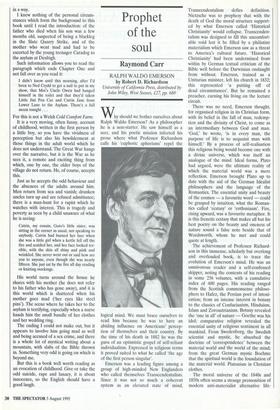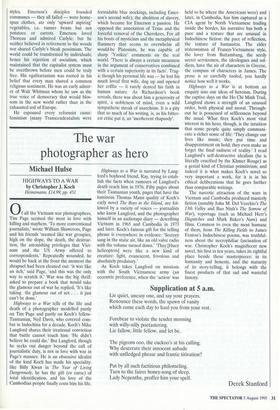Prophet of the soul
Raymond Carr
RALPH WALDO EMERSON by Robert D. Richardson University of California Press, distributed by John Wiley, West Sussex, £27, pp. 680 Why should we bother ourselves about Ralph Waldo Emerson? As a philosopher he is a non-starter. He saw himself as a seer, and his poetic mission infected his prose where what Professor Richardson calls his 'euphoric aphorisms' repel the logical mind. We must brace ourselves to read him because he was to have an abiding influence on Americans' percep- tion of themselves and their country. By the time of his death in 1882 he was the guru of an optimistic gospel of self-reliant individualism. Expressed in religious terms it proved suited to what he called 'the age of the first person singular'.
Emerson was a leading figure among a group of high-minded New Englanders who called themselves Transcendentalists. Since it was not so much a coherent system as an elevated state of mind, Transcendentalism defies definition.
Nietzsche was to prophesy that with the death of God the moral structure support- ed by what Emerson called 'Historical Christianity' would collapse. Transcenden- talism was designed to fill this uncomfort- able void lest it be filled by a philistine materialism which Emerson saw as a threat to America's cultural future. 'Historical Christianity' had been undermined from within by German textual criticism of the Bible well before the Darwinian onslaught from without. Emerson, trained as a Unitarian minister, left his church in 1832; this represented 'a putting off of dead circumstances'. But he remained a preacher, earning his living on the lecture circuit.
There was no need, Emerson thought, for organised religion in its Christian form, with its belief in the fall of man, redemp- tion and the divinity of Christ, to come as an intermediary between God and man.
'God,' he wrote, 'is in every man, the purpose of life is to acquaint man with himself.' By a process of self-realisation this religious being would become one with a divine universe, which was itself an analogue of the mind. Ideal forms, Plato had argued, were the ultimate reality of which the material world was a mere reflection. Emerson brought Plato up to date with the aid of the German Idealist philosophers and the language of the Romantics. The essential unity and beauty of the cosmos — a favourite word — could be grasped by intuition, what the Roman- tics called 'ecstasy' or 'enthusiasm'. Fire, rising upward, was a favourite metaphor. It is this frenetic ecstasy that makes all but his best poetry on the beauty and oneness of nature sound a false note beside that of Wordsworth, whom he met and could quote at length.
The achievement of Professor Richard- son in this immense, scholarly but overlong and overloaded book, is to trace the evolution of Emerson's mind. He was an omnivorous reader and a self-confessed skipper, noting the contents of his reading in some 236 volumes, with a cumulative index of 400 pages. His reading ranged from the Scottish commonsense philoso- phers to Hafez, the Persian poet of intoxi- cation; from an intense interest in botany to the classics of Confucianism, Hinduism, Islam and Zoroastrianism. Botany revealed the 'one in all' of nature — Goethe was his idol; comparative religion revealed the essential unity of religious sentiment in all mankind. From Swedenborg, the Swedish scientist and mystic, he absorbed the doctrine of 'correspondence' between the material world and the world of the mind; from the great German mystic Boehme that the spiritual world is the foundation of the material world. Platonism in Christian clothes.
The moral universe of the 1840s and 1850s often seems a strange premonition of modern anti-materialist alternative life- styles. Emerson's disciples founded communes — they all failed — wore home- spun clothes, ate only 'upward aspiring' vegetables, i.e. runner beans but not potatoes or carrots. Emerson loved Thoreau and admired Carlyle; but he neither believed in retirement to the woods nor shared Carlyle's bleak pessimism. The world could be transformed by individuals; hence his rejection of socialism, which maintained that the capitalist system must be overthrown before men could be truly free. His egalitarianism was rooted in his belief that every man shared a common religious sentiment. He was an early admir- er of Walt Whitman whom he saw as the true voice of democracy that would blos- som in the new world rather than in the exhausted soil of Europe.
He espoused every reformist cause: feminism (many Transcendentalists were formidable blue stockings, including Emer- son's second wife); the abolition of slavery, which became for Emerson a passion. He opposed the annexation of Texas and the forceful removal of the Cherokees. For all his bouts of mysticism and the metaphysical flummery that seems to overwhelm all would-be Platonists, he was capable of sharp 'Yankee' comments on the real world. 'There is always a certain meanness in the argument of conservatives combined with a certain superiority in its facts'. Trag- ic though his personal life was — he lost his much loved first wife, dug up and opened her coffin — it rarely dented his faith in human nature. As Richardson's book reveals, there was about him a generosity of spirit, a nobleness of mind, even a wild sympathetic streak of anarchism. It is a pity that so much of his writing, is, as his bitter- est critic put it, an 'incoherent rhapsody'.



















































 Previous page
Previous page